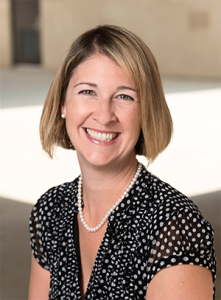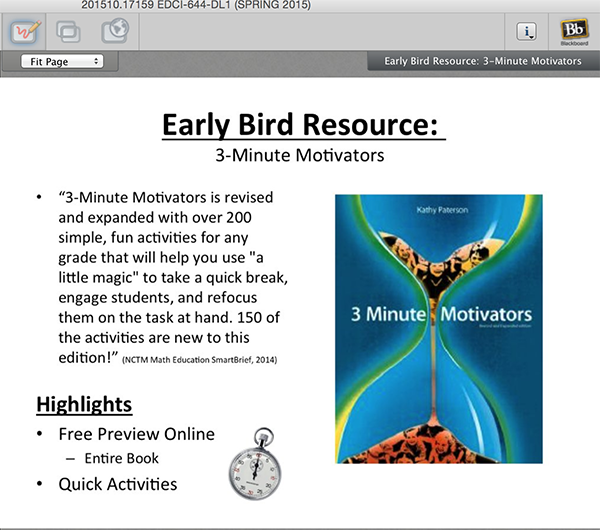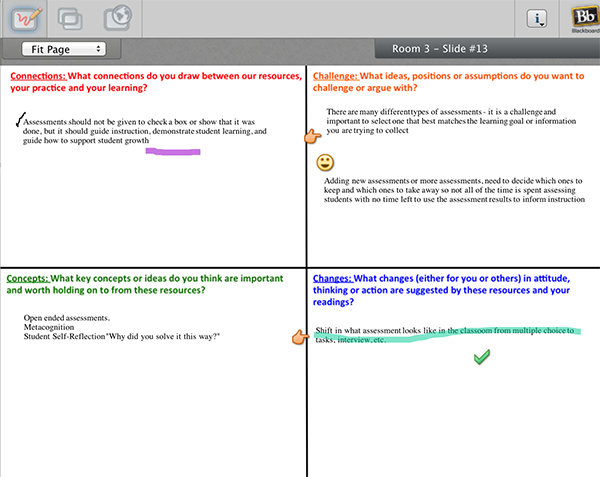
One of the first of its kind, Mason’s hybrid online Education Leadership master’s program for mathematics specialists prepares teachers to take on leadership roles and explore school-based leadership issues. A required course for the program, Dr. Courtney Baker’s newly online section of EDCI 644: Mathematics Learning and Assessment introduces learning theories and associated assessment practices specific to math education. Through the successful integration of the synchronous learning tool Blackboard Collaborate, Dr. Baker is able to provide her students with the opportunity to gain networking and leadership skills while benefiting from the flexibility of the online environment.
“While the cohort model was nice for getting to really know a group of individuals, the open enrollment model that we’ve moved toward is great for networking and gaining a wealth of knowledge and experience from other new folks in the program,” suggests Dr. Baker. “Our students come from all different walks of life and experience levels. Certain things may or may not apply to you as a teacher or math specialist, but the most important thing I can give them is networking. They’re going to have to know that.”
Synchronous Engagement
A few minutes before the start of every class, Dr. Baker leverages the synchronous learning environment to engage students and provide an early bird resource slide. “Logging on early and providing these slides helps me to build those relationships and get students engaged with me as the instructor,” she explains. “Depending on the resource, students will log in early to talk about it, even though it’s not mandatory.” Dr. Baker’s unique facilitation encourages students to discuss topics that apply directly to their careers.
“I’ve had a few online classes at Mason and Dr. Baker’s were definitely on the top tier of engaging students. She varied the format, allowed for breakout discussions as well as full group discussion, and really utilized the online format as a classroom style as opposed to trying to fit in-person teaching techniques online,” shares online student Kathryn Pike.

Leadership Projects
Another exemplary aspect of the course, students appreciate Dr. Baker’s focus on meaningful and relevant coursework based around themes such as assessment, school change, and curriculum. Assignments include anything from conducting critical interviews with a student and researching learning progressions to coaching and collaborating with another teacher to craft a lesson plan. Students also have the chance to earn moderator access to lead discussion, engaging fully with Collaborate and learning to use it as a robust teaching tool.
“You can play with roles for people to take in a synchronous setting. I would make two or three people moderators each week,” says Dr. Baker. “There is also a trust in the process and letting go. Rather than feel the need to be in charge, I realize that they’re students and engaged in owning their own learning. This format gives them a chance to do that.”

Meaningful Connections
For online student Kimberly Hayden, the online format has proven especially beneficial in forging professional bonds with classmates, noting, “I have already established a network of close colleagues from the courses I’ve taken.” Her classmate Sara Binder agrees, “Much of what we do involves working with other people. Any field that works with others has challenges to it. It was great being able to ask questions and always have many different responses and ways to solve a problem.”
Binder continues, “Taking advantage of all of the different tools that the online interface allowed, Dr. Baker did a great job making everybody feel comfortable and have the ability to share our opinions with the class or with a small group while online.”
Interested in learning more about the hybrid online Education Leadership, Mathematics Specialist Leader (K-8) Concentration (MEd) program? Check out our program profile here!
